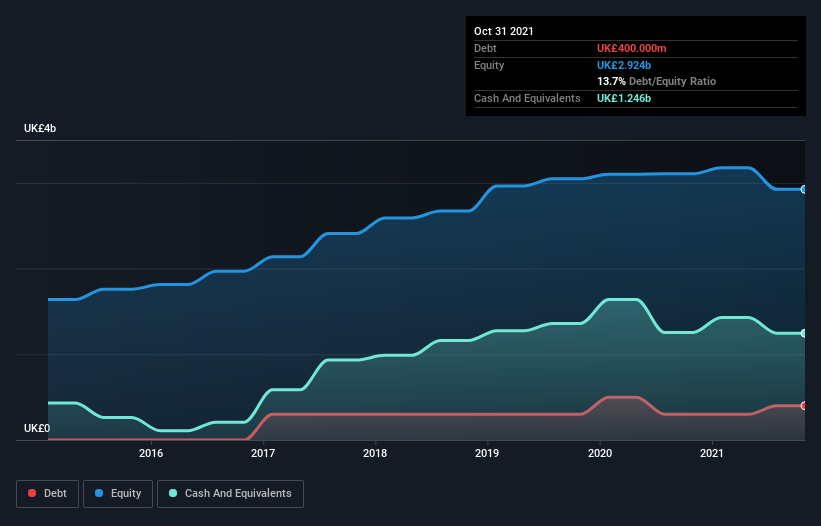Is Berkeley Group Holdings (LON:BKG) Using Too Much Debt?
David Iben put it well when he said, 'Volatility is not a risk we care about. What we care about is avoiding the permanent loss of capital.' So it seems the smart money knows that debt - which is usually involved in bankruptcies - is a very important factor, when you assess how risky a company is. We note that The Berkeley Group Holdings plc (LON:BKG) does have debt on its balance sheet. But should shareholders be worried about its use of debt?
What Risk Does Debt Bring?
Debt and other liabilities become risky for a business when it cannot easily fulfill those obligations, either with free cash flow or by raising capital at an attractive price. Part and parcel of capitalism is the process of 'creative destruction' where failed businesses are mercilessly liquidated by their bankers. While that is not too common, we often do see indebted companies permanently diluting shareholders because lenders force them to raise capital at a distressed price. Of course, plenty of companies use debt to fund growth, without any negative consequences. The first thing to do when considering how much debt a business uses is to look at its cash and debt together.
View our latest analysis for Berkeley Group Holdings
What Is Berkeley Group Holdings's Net Debt?
The image below, which you can click on for greater detail, shows that at October 2021 Berkeley Group Holdings had debt of UK£400.0m, up from UK£300.0m in one year. But on the other hand it also has UK£1.25b in cash, leading to a UK£845.5m net cash position.
How Healthy Is Berkeley Group Holdings' Balance Sheet?
Zooming in on the latest balance sheet data, we can see that Berkeley Group Holdings had liabilities of UK£1.76b due within 12 months and liabilities of UK£788.3m due beyond that. On the other hand, it had cash of UK£1.25b and UK£84.9m worth of receivables due within a year. So its liabilities total UK£1.22b more than the combination of its cash and short-term receivables.
This deficit isn't so bad because Berkeley Group Holdings is worth UK£5.31b, and thus could probably raise enough capital to shore up its balance sheet, if the need arose. But it's clear that we should definitely closely examine whether it can manage its debt without dilution. While it does have liabilities worth noting, Berkeley Group Holdings also has more cash than debt, so we're pretty confident it can manage its debt safely.
Another good sign is that Berkeley Group Holdings has been able to increase its EBIT by 24% in twelve months, making it easier to pay down debt. When analysing debt levels, the balance sheet is the obvious place to start. But it is future earnings, more than anything, that will determine Berkeley Group Holdings's ability to maintain a healthy balance sheet going forward. So if you want to see what the professionals think, you might find this free report on analyst profit forecasts to be interesting.
Finally, while the tax-man may adore accounting profits, lenders only accept cold hard cash. Berkeley Group Holdings may have net cash on the balance sheet, but it is still interesting to look at how well the business converts its earnings before interest and tax (EBIT) to free cash flow, because that will influence both its need for, and its capacity to manage debt. During the last three years, Berkeley Group Holdings produced sturdy free cash flow equating to 63% of its EBIT, about what we'd expect. This free cash flow puts the company in a good position to pay down debt, when appropriate.
Summing up
While Berkeley Group Holdings does have more liabilities than liquid assets, it also has net cash of UK£845.5m. And we liked the look of last year's 24% year-on-year EBIT growth. So is Berkeley Group Holdings's debt a risk? It doesn't seem so to us. When analysing debt levels, the balance sheet is the obvious place to start. But ultimately, every company can contain risks that exist outside of the balance sheet. Case in point: We've spotted 1 warning sign for Berkeley Group Holdings you should be aware of.
If, after all that, you're more interested in a fast growing company with a rock-solid balance sheet, then check out our list of net cash growth stocks without delay.
Have feedback on this article? Concerned about the content? Get in touch with us directly. Alternatively, email editorial-team (at) simplywallst.com.
This article by Simply Wall St is general in nature. We provide commentary based on historical data and analyst forecasts only using an unbiased methodology and our articles are not intended to be financial advice. It does not constitute a recommendation to buy or sell any stock, and does not take account of your objectives, or your financial situation. We aim to bring you long-term focused analysis driven by fundamental data. Note that our analysis may not factor in the latest price-sensitive company announcements or qualitative material. Simply Wall St has no position in any stocks mentioned.

 Yahoo Finance
Yahoo Finance 
